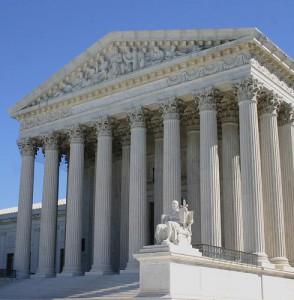What Is Religious Liberty? The Difference Between Holt and Hobby Lobby

Many humanists are often concerned with questions of religious liberty. How can the freedom from religion, as well as the freedom of religion be protected? And what can we do about the abuses of “religious liberty,” especially when the concept is used to privilege certain religious groups at everyone else’s expense?
The U.S. Supreme Court’s recent ruling on a religious liberty case, Holt v. Hobbs, sheds light on a few of these questions, especially when it is compared to the Court’s ruling on Burwell v. Hobby Lobby, which privileged the religious beliefs of corporate shareholders over the needs of women for contraceptive healthcare. What made many humanists angry about the Hobby Lobby ruling was that this unnecessary religious exemption for closely-held corporations infringed upon the rights of women to reproductive care granted to them by the Affordable Care Act. The religious right, many argued, could use the Hobby Lobby ruling as a means to avoid other secular laws that it finds distasteful. Far from guaranteeing religious liberty, the Court’s decision in Hobby Lobby unfairly imposed the religious beliefs of a few people upon their many employees.
Like the Hobby Lobby case, Holt v. Hobbs was a case about religious liberty. In October 2014, the Court heard arguments about the right of Arkansas prison inmate Gregory Holt, also known as Abdul Maalik Muhammad, to grow a beard. A practicing Salafi Muslim, Maalik Muhammad believes that having at least a half-inch beard is a requirement of his faith. Unlike over forty other prison systems across the country, however, Arkansas bans prisoners from growing beards, except when an inmate has a dermatological condition that prevents him from shaving. Then he is permitted to grow a quarter-inch beard. The prison argued that its regulations were meant to prevent prisoners from disguising themselves or from hiding contraband in their facial hair.
Just last week, the Supreme Court issued its unanimous ruling in favor of Holt, who will now be permitted to grow a half-inch beard. The decision was based on the 2000 federal Religious Land Use and Institutionalized Persons Act, which is similar to the controversial Religious Freedom Restoration Act upon which the Hobby Lobby ruling was based. The difference between the ways in which the Court applied these similar laws was succinctly summarized in Justice Ginsburg’s concurring opinion. Ginsburg stated, “Unlike the exemption this Court approved in Burwell v. Hobby Lobby Stores, Inc., accommodating petitioner’s religious belief in this case would not detrimentally affect others who do not share petitioner’s belief.” In the case of Hobby Lobby, religious accommodations infringed upon the rights of employees to contraceptives. In the case of Holt, however, the religious accommodation would only affect Maalik Muhammad and would not curtail the rights of anyone else.
While the Supreme Court’s ruling and Justice Ginsburg’s concurrence offer some insight into the balance the Court could strike between upholding the rights of religious individuals to practice their beliefs and the rights of everyone else not to be constrained by those beliefs, questions about religious liberty in the courts are far from over. Though many might agree with the executive director of Americans United for Separation of Church and State, Rev. Barry W. Lynn, that in Holt the Court “struck the proper balance,” there are still many issues regarding the separation of church and state to be decided. Some of these decisions may uphold true religious liberty by ensuring that Jefferson’s Wall is maintained, while others will undoubtedly grant unnecessary privilege to religion at the expense of secularism.
